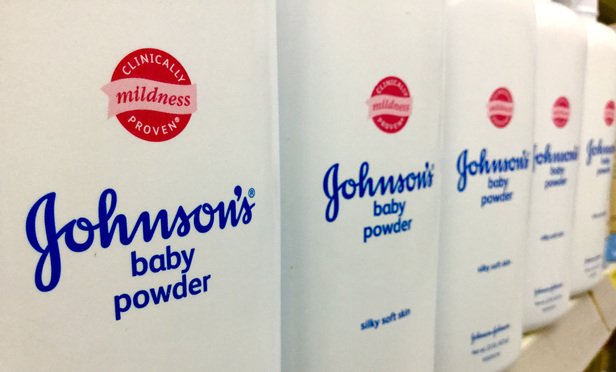Johnson & Johnson Gets Second Talc Defense Win in a Week
"This is the fourth consecutive verdict in favor of Johnson & Johnson in these cases and the eighth defense verdict this year," said a Johnson & Johnson spokeswoman.
December 21, 2019 at 12:11 PM
2 minute read
 Johnson & Johnson's baby powder. (Photo: Mike Mozart/Flickr)
Johnson & Johnson's baby powder. (Photo: Mike Mozart/Flickr)
A St. Louis jury has rejected claims that Johnson & Johnson's baby powder caused a woman's ovarian cancer, the second defense win for the company in the past week.
Friday's verdict involved claims from plaintiff Vickie Forrest, who was one of 13 women whose case was halted by the Missouri Supreme Court earlier this year. Allison Brown of Skadden, Arps, Slate, Meagher & Flom and Michael Brown of Nelson Mullins Riley & Scarborough defended Johnson & Johnson.
"This is the fourth consecutive verdict in favor of Johnson & Johnson in these cases and the eighth defense verdict this year," said Johnson & Johnson spokeswoman Kimberly Montagnino. "The jury carefully considered the decades of independent clinical evidence, which show Johnson's baby powder is safe, does not contain asbestos, and does not cause cancer. We know that anyone suffering from cancer is searching for answers, which is why the science and facts on this topic are so important."
Ted Meadows and David Dearing of Beasley Allen; Allen Smith of The Smith Law Firm; and Michelle Parfitt of Ashcraft & Gerel represented Forrest in the St. Louis Circuit Court trial.
"It's disappointing that J&J will view this verdict as approval of the continued sale of talc-based body powder that harms women," Meadows said in a statement.
Johnson & Johnson earlier in the week received a defense verdict in Los Angeles Superior Court, beating back claims its talcum powder caused the plaintiff to get mesothelioma in 2016. Joseph Satterley of Kazan, McClain, Satterley & Greenwood represented the plaintiff.
Johnson & Johnson's attorneys at Kirkland & Ellis accused the plaintiff's lawyers of misconduct in that case. The judge refused to grant Johnson & Johnson a mistrial, but Kazan McClain brought in Keker, Van Nest & Peters to respond to the misconduct claims.
Johnson & Johnson, which has also lost several verdicts, including one last year awarding $4.7 billion to 22 women, has criticized state court trials for allowing "junk science" into the courtroom. Several of the verdicts were overturned on appeal.
This content has been archived. It is available through our partners, LexisNexis® and Bloomberg Law.
To view this content, please continue to their sites.
Not a Lexis Subscriber?
Subscribe Now
Not a Bloomberg Law Subscriber?
Subscribe Now
NOT FOR REPRINT
© 2025 ALM Global, LLC, All Rights Reserved. Request academic re-use from www.copyright.com. All other uses, submit a request to [email protected]. For more information visit Asset & Logo Licensing.
You Might Like
View All
Plaintiff Narrowly Avoids Dismissal Over Lengthy Complaint Filed in Federal Court
4 minute read
'Discordant Dots': Why Phila. Zantac Judge Rejected Bid for His Recusal
3 minute read
Pittsburgh Jury Tries to Award $22M Against J&J in Talc Case Despite Handing Up Defense Verdict
4 minute read
Pharma Company Faces Breach-of-Contract Claim Over $1.3 Million in Unpaid Invoices
3 minute readLaw Firms Mentioned
Trending Stories
Who Got The Work
J. Brugh Lower of Gibbons has entered an appearance for industrial equipment supplier Devco Corporation in a pending trademark infringement lawsuit. The suit, accusing the defendant of selling knock-off Graco products, was filed Dec. 18 in New Jersey District Court by Rivkin Radler on behalf of Graco Inc. and Graco Minnesota. The case, assigned to U.S. District Judge Zahid N. Quraishi, is 3:24-cv-11294, Graco Inc. et al v. Devco Corporation.
Who Got The Work
Rebecca Maller-Stein and Kent A. Yalowitz of Arnold & Porter Kaye Scholer have entered their appearances for Hanaco Venture Capital and its executives, Lior Prosor and David Frankel, in a pending securities lawsuit. The action, filed on Dec. 24 in New York Southern District Court by Zell, Aron & Co. on behalf of Goldeneye Advisors, accuses the defendants of negligently and fraudulently managing the plaintiff's $1 million investment. The case, assigned to U.S. District Judge Vernon S. Broderick, is 1:24-cv-09918, Goldeneye Advisors, LLC v. Hanaco Venture Capital, Ltd. et al.
Who Got The Work
Attorneys from A&O Shearman has stepped in as defense counsel for Toronto-Dominion Bank and other defendants in a pending securities class action. The suit, filed Dec. 11 in New York Southern District Court by Bleichmar Fonti & Auld, accuses the defendants of concealing the bank's 'pervasive' deficiencies in regards to its compliance with the Bank Secrecy Act and the quality of its anti-money laundering controls. The case, assigned to U.S. District Judge Arun Subramanian, is 1:24-cv-09445, Gonzalez v. The Toronto-Dominion Bank et al.
Who Got The Work
Crown Castle International, a Pennsylvania company providing shared communications infrastructure, has turned to Luke D. Wolf of Gordon Rees Scully Mansukhani to fend off a pending breach-of-contract lawsuit. The court action, filed Nov. 25 in Michigan Eastern District Court by Hooper Hathaway PC on behalf of The Town Residences LLC, accuses Crown Castle of failing to transfer approximately $30,000 in utility payments from T-Mobile in breach of a roof-top lease and assignment agreement. The case, assigned to U.S. District Judge Susan K. Declercq, is 2:24-cv-13131, The Town Residences LLC v. T-Mobile US, Inc. et al.
Who Got The Work
Wilfred P. Coronato and Daniel M. Schwartz of McCarter & English have stepped in as defense counsel to Electrolux Home Products Inc. in a pending product liability lawsuit. The court action, filed Nov. 26 in New York Eastern District Court by Poulos Lopiccolo PC and Nagel Rice LLP on behalf of David Stern, alleges that the defendant's refrigerators’ drawers and shelving repeatedly break and fall apart within months after purchase. The case, assigned to U.S. District Judge Joan M. Azrack, is 2:24-cv-08204, Stern v. Electrolux Home Products, Inc.
Featured Firms
Law Offices of Gary Martin Hays & Associates, P.C.
(470) 294-1674
Law Offices of Mark E. Salomone
(857) 444-6468
Smith & Hassler
(713) 739-1250








